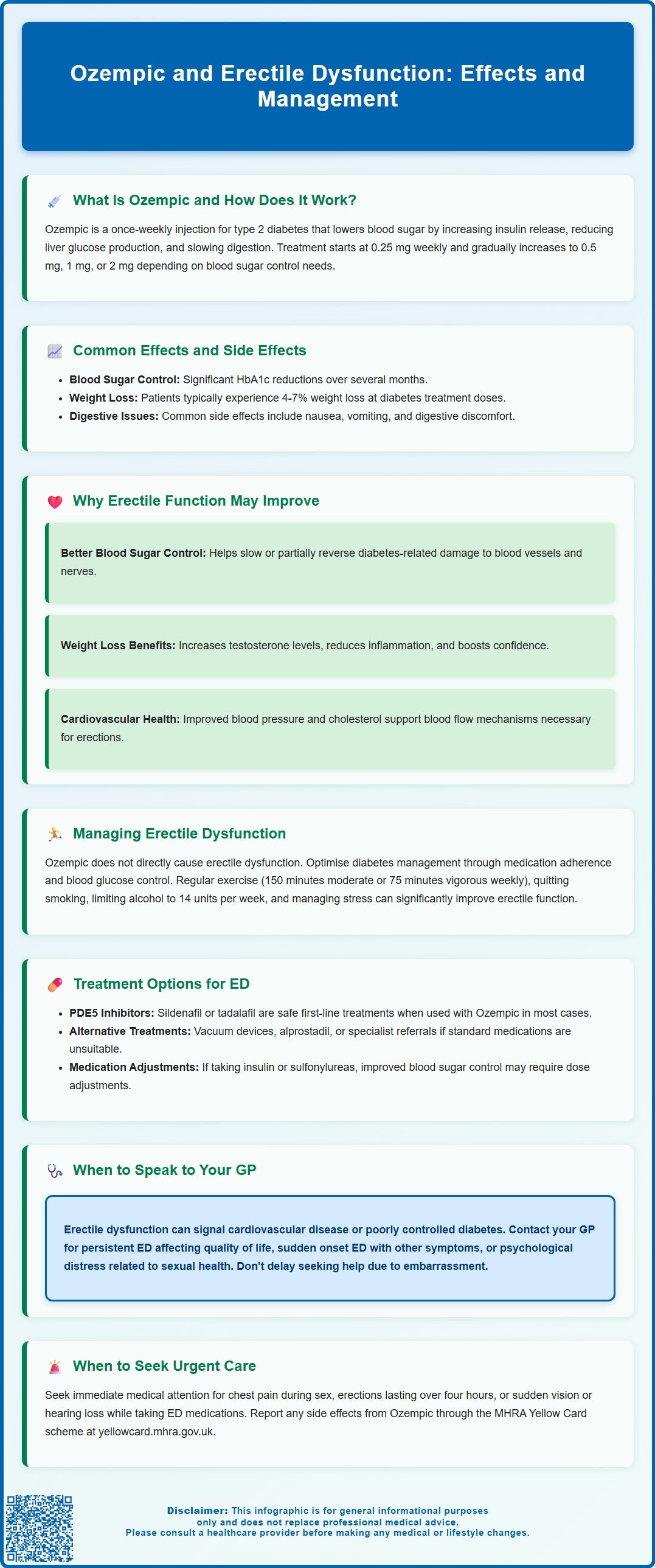Ozempic and erectile dysfunction is a topic of growing interest among men with type 2 diabetes. Ozempic (semaglutide) is a GLP-1 receptor agonist licensed in the UK for managing type 2 diabetes through once-weekly injections. Whilst Ozempic does not directly treat erectile dysfunction, improvements in glycaemic control, weight loss, and cardiovascular health associated with the medication may indirectly benefit erectile function. Erectile dysfunction affects many men with diabetes due to vascular damage, neuropathy, and metabolic factors. This article explores the relationship between Ozempic treatment and sexual health, evidence-based management strategies, and when to seek professional guidance.
Summary: Ozempic does not directly treat erectile dysfunction, but may indirectly improve erectile function through better glycaemic control, weight loss, and cardiovascular health improvements in men with type 2 diabetes.
- Ozempic (semaglutide) is a GLP-1 receptor agonist licensed for type 2 diabetes management, administered as a once-weekly subcutaneous injection.
- Erectile dysfunction in diabetes results from vascular damage, autonomic neuropathy, endothelial dysfunction, and hormonal imbalances caused by chronic hyperglycaemia and obesity.
- Improvements in erectile function with Ozempic occur indirectly through better blood glucose control, weight reduction, and enhanced cardiovascular health rather than direct pharmacological effects.
- PDE5 inhibitors such as sildenafil or tadalafil remain first-line treatments for erectile dysfunction and can be safely used alongside Ozempic in most cases.
- Men experiencing persistent erectile dysfunction should consult their GP for comprehensive assessment including diabetes control review, cardiovascular risk evaluation, and hormonal testing.
- Lifestyle modifications including regular physical activity, smoking cessation, limited alcohol intake, and stress management significantly impact erectile function in men with diabetes.
Table of Contents
What Is Ozempic and How Does It Work?
Ozempic (semaglutide) is a prescription medicine licensed in the UK for the treatment of type 2 diabetes mellitus. It belongs to a class of drugs called glucagon-like peptide-1 (GLP-1) receptor agonists, which work by mimicking the action of a naturally occurring hormone that regulates blood sugar levels and appetite.
The medication is administered as a once-weekly subcutaneous injection, typically into the abdomen, thigh, or upper arm. Treatment usually starts at 0.25 mg weekly for 4 weeks, then increases to 0.5 mg, with further titration to 1 mg or 2 mg if needed for glycaemic control. Ozempic works through several complementary mechanisms:
-
Stimulating insulin secretion from the pancreas when blood glucose levels are elevated
-
Suppressing glucagon release, which reduces glucose production by the liver
-
Slowing gastric emptying, which helps control post-meal blood sugar spikes
-
Reducing appetite through effects on brain centres that regulate hunger
These combined actions help improve glycaemic control in adults with type 2 diabetes, often leading to significant reductions in HbA1c levels. Many patients also experience weight loss of approximately 4-7% over several months at the doses used for diabetes management.
Ozempic is typically prescribed when lifestyle modifications and first-line oral medications such as metformin have not achieved adequate blood sugar control. According to NICE guideline NG28, GLP-1 receptor agonists may be considered as part of triple therapy or with insulin when specific clinical criteria are met.
Common side effects include nausea, vomiting, diarrhoea and constipation, which often improve with time. Patients should be aware of warning signs of pancreatitis (severe abdominal pain) and the potential risk of diabetic retinopathy worsening with rapid improvement in blood glucose. When used with insulin or sulfonylureas, there is an increased risk of hypoglycaemia, which may require dose adjustments of these medications.

Why Erectile Function May Improve With Ozempic Treatment
Men with type 2 diabetes experience erectile dysfunction (ED) more commonly than the general population. The relationship between Ozempic and erectile function is primarily indirect, mediated through improvements in the underlying metabolic conditions that contribute to ED.
Diabetes-related erectile dysfunction typically develops through several pathological mechanisms:
-
Vascular damage from chronic hyperglycaemia, which impairs blood flow to penile tissues
-
Autonomic neuropathy affecting the nerves responsible for initiating and maintaining erections
-
Endothelial dysfunction, reducing the production of nitric oxide necessary for smooth muscle relaxation
-
Hormonal imbalances, including reduced testosterone levels often associated with obesity
When Ozempic improves glycaemic control, it may help slow or partially reverse some of these processes. Better blood sugar management reduces ongoing vascular and nerve damage, potentially preserving erectile function. Additionally, the weight loss many patients experience can have positive effects on sexual health. Obesity is independently associated with ED through multiple pathways, including reduced testosterone, increased inflammation, and psychological factors affecting confidence and body image.
Research suggests that significant weight reduction may lead to improvements in erectile function for many men. Furthermore, improved cardiovascular health—including better blood pressure control and lipid profiles—supports the vascular mechanisms essential for normal erections. It is important to emphasise that there is no established direct pharmacological link between semaglutide and erectile function; rather, any improvements likely result from treating the underlying metabolic dysfunction that contributes to ED in the first place.
Managing Erectile Dysfunction While Taking Ozempic
If you are experiencing erectile dysfunction whilst taking Ozempic, a comprehensive approach addressing both the medication and underlying health factors is essential. It is worth noting that ED may have been present before starting treatment, and Ozempic is not known to directly cause erectile dysfunction, though individual responses to medications can vary.
Optimising your diabetes management remains the foundation of treatment. This includes:
-
Adhering to your prescribed Ozempic regimen and attending regular monitoring appointments
-
Maintaining target blood glucose levels through diet, exercise, and medication compliance
-
Addressing other cardiovascular risk factors such as hypertension and high cholesterol
-
Achieving and maintaining a healthy weight through sustainable lifestyle changes
Lifestyle modifications can significantly impact erectile function:
-
Regular physical activity (at least 150 minutes of moderate or 75 minutes of vigorous activity weekly, plus muscle-strengthening activities on at least 2 days per week) improves cardiovascular health and erectile function
-
Smoking cessation is crucial, as tobacco use severely impairs vascular function
-
Limiting alcohol consumption to no more than 14 units per week, spread over 3 or more days
-
Stress management and adequate sleep, as psychological factors substantially affect sexual function
If erectile dysfunction persists despite good metabolic control, pharmacological treatments may be appropriate. Phosphodiesterase-5 (PDE5) inhibitors such as sildenafil, tadalafil, or vardenafil are first-line treatments for ED and can be safely used alongside Ozempic in most cases. These medications are contraindicated with nitrates and riociguat, and caution is needed with alpha-blockers and certain other medications.
Your GP or diabetes specialist can assess whether PDE5 inhibitors are suitable for you. If these are unsuitable or ineffective, alternative treatments such as vacuum devices or alprostadil may be considered. Some men may benefit from referral to specialist services, including urology, endocrinology, or psychosexual therapy, depending on the underlying causes identified.
If you are taking insulin or sulfonylureas alongside Ozempic, be aware that improved glycaemic control may increase the risk of hypoglycaemia, requiring dose adjustments of these medications.
When to Speak to Your GP About Sexual Health Concerns
Erectile dysfunction is a common medical condition that warrants professional evaluation, yet many men delay seeking help due to embarrassment. It is important to recognise that ED can be an early indicator of cardiovascular disease or inadequately controlled diabetes, making medical assessment essential.
You should contact your GP if:
-
You experience persistent or worsening erectile dysfunction that affects your quality of life or relationships
-
ED develops suddenly or is accompanied by other symptoms such as chest pain, breathlessness, or new neurological symptoms
-
You have concerns about how your diabetes or its treatment may be affecting your sexual function
-
You are experiencing psychological distress, anxiety, or depression related to sexual health
-
You wish to discuss treatment options for ED, including whether PDE5 inhibitors are appropriate for you
Seek urgent medical attention if you experience:
-
Chest pain or cardiovascular symptoms during sexual activity
-
A painful erection lasting more than four hours (priapism)
-
Sudden loss of vision or hearing whilst taking ED medications
Your GP can conduct a comprehensive assessment including:
-
Review of your diabetes control (HbA1c, blood glucose patterns)
-
Cardiovascular risk assessment (QRISK) and blood pressure measurement
-
Hormonal evaluation, including morning testosterone levels (before 11am) on two separate occasions if clinically indicated
-
Medication review to identify any drugs that may contribute to ED
-
Discussion of psychological factors and relationship issues
Remember that sexual health is an integral component of overall wellbeing, and healthcare professionals are accustomed to discussing these concerns in a confidential, non-judgemental manner. Early intervention often leads to better outcomes, and many effective treatments are available. If you are taking Ozempic and have questions about its effects on sexual function—whether positive or negative—your diabetes care team is the appropriate resource for evidence-based guidance tailored to your individual circumstances.
If you experience any side effects while taking Ozempic, including any potential impact on sexual function, you can report these through the MHRA Yellow Card scheme at yellowcard.mhra.gov.uk or via the Yellow Card app.
Scientific References
Frequently Asked Questions
Can Ozempic cause erectile dysfunction?
Ozempic is not known to directly cause erectile dysfunction. Any erectile dysfunction experienced may have been present before starting treatment due to underlying diabetes and metabolic factors.
Will Ozempic improve my erectile dysfunction?
Ozempic may indirectly improve erectile function through better blood sugar control, weight loss, and improved cardiovascular health, which address underlying causes of diabetes-related erectile dysfunction. However, there is no direct pharmacological effect on erectile function.
Can I take Viagra or other ED medications whilst on Ozempic?
Yes, PDE5 inhibitors such as sildenafil (Viagra), tadalafil, or vardenafil can be safely used alongside Ozempic in most cases. Your GP can assess whether these medications are suitable for you based on your individual health circumstances.
The health-related content published on this site is based on credible scientific sources and is periodically reviewed to ensure accuracy and relevance. Although we aim to reflect the most current medical knowledge, the material is meant for general education and awareness only.
The information on this site is not a substitute for professional medical advice. For any health concerns, please speak with a qualified medical professional. By using this information, you acknowledge responsibility for any decisions made and understand we are not liable for any consequences that may result.
Heading 1
Heading 2
Heading 3
Heading 4
Heading 5
Heading 6
Lorem ipsum dolor sit amet, consectetur adipiscing elit, sed do eiusmod tempor incididunt ut labore et dolore magna aliqua. Ut enim ad minim veniam, quis nostrud exercitation ullamco laboris nisi ut aliquip ex ea commodo consequat. Duis aute irure dolor in reprehenderit in voluptate velit esse cillum dolore eu fugiat nulla pariatur.
Block quote
Ordered list
- Item 1
- Item 2
- Item 3
Unordered list
- Item A
- Item B
- Item C
Bold text
Emphasis
Superscript
Subscript










